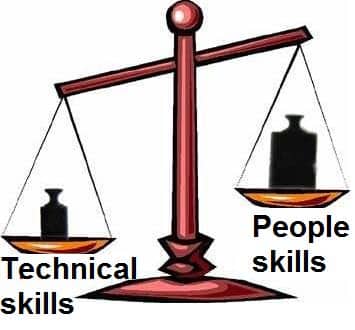In modern day working culture, to solely define skill in technical terms, may be viewed as simplistic and inaccurate. However, it can be seen as a traditional interpretation. Skill as a whole has always been apparent within the nature of work with a higher level of education equating to a higher level of earnings. The increase in human capital may be due to expertise and skill level within a working role. However, this is only dependent on the market the worker has skills within.
It can be viewed that having a developed array of skills within low-level vocations may be considered as “transferable” from one vocation to another – say communication skills which are a soft skill. In this blog, I wanted to explore the acknowledgment and subsequent change of opinion of specific skills, and how the development of the service sector, which could be classed as a ‘low-level’ vocation, has since benefitted and incorporated soft skills as a primary desired competency. I want to develop the ideas surrounding the relation of soft skills with gender, stereotyping and pay and whether employees and employers benefit from this new change in skill focus.
Historically, skills used to be viewed as tangible, highly skilled, physical and visible. Men were deemed as the sex with the highest skill set as the physical nature of work about skill was mainly focused on male working roles such as welding and manufacturing. There is the argument that individual skills and therefore vocations are related to a particular gender, with stereotypes being created for these roles, limiting recruitment for employers and work for employees. Furthermore, once recruited, men and women are judged differently at work and would be marked down and potentially disciplined if the desired stereotype was not fulfilled.
The issue surrounding gender and skill highlights an extra dimension to working stereotypes. It can be viewed that it is not merely managers stereotyping roles, but what management think customers want regarding stereotypes, with jobs being designed in this nature. Stereotypes incorporate issues of gender within the workplace with women being perceived to be best suited in customer service roles and men to be more suited to sales. These stereotypes seem unjustified as during World War 1 women focused on jobs that were previously undertaken by men. An increase in factory production meant more workers were needed. Women were carrying out jobs they had never been trained for and in a time when employers would never have hired them. This demonstration of the shift in gender roles contradicts stereotypes once formed and believed.
Personality or Taught traits?
Due to the adaptation of perception of skill, the term soft skill has been introduced into the modern working environment. These types of skill have always been present within the nature of work, however, have never been recognised as skills. Skill can now be seen as the way an individual carries out something which could relate to their attributes. These can vary from technical and professionally learned skills or soft skills such as communication, decision making, and customer handling. Some argue that ‘soft-skills’ are not recognised as skills at all, but rather part of the natural order of things’. This view would support the concept that soft skills are personality traits and attribute that one may possess and cannot be taught or trained.
The introduction and understanding of soft and social skills allow employees to put technical skills into practice. To receive recognition in the workplace, technical expertise may be put into practice when it is coupled with soft skills. Different sectors require a varied level of skill, both technical and ‘soft’, which is not apparent unless the job is being carried out. Problem-solving may be viewed as a soft skill and may only put into practice once an employee has highlighted the problem but then has the technical skill to carry out the resolution.
‘Soft’ skill in relation to the employer
Through recruitment, employers are advertising and hiring workers with two out of three skills being specifically ‘soft’. While I believe soft skills to be integral to succeeding in the majority of employment, I also believe that it is easy to train an employee in a practical or technical skill, however, significantly harder to change somebody’s attitude. With the perception that ‘soft’ skills cannot be learned but are innately within a person, personality is given priority in this recruitment process. This may benefit the employer who is recruiting, as they will have a set of traits listed, which they desire for the role they are hiring. This list may be vague and highly subjective focusing on what the employer wants opposed to what may be necessary for the role, for example, experience and technical ability. Demands of skills vary from each employer, and it can be argued it is their prerogative what requirements they wish to judge on.
‘Soft’ skills are even more important now since working environment has changed from manufacturing to service. An employment contract may now include the way an employee feels and acts as well as their decorum with-in the workplace and within the scope of their job. This change in perspective has allowed ‘soft’ skills to become a legitimate area for managers to manage.
After the recruitment process, the HRM cycle continues with performance management being the primary focus in relation to pay and earnings. Performance appraisals and promotions are areas where employees are assessed through the ability and level of ‘soft’ skills they acquire. Employers are appraising regarding soft skills opposed to the technical ability which affects the pay and career prospects for an employee. Soft skills may be an integral part of all work, however, are tough to assess without prejudice and stereotypes getting involved. However, this can be addressed with accurately written person specifications and job descriptions for each role. An employer may find the process of performance management and appraisal challenging due to the nature of work, especially within the service sector where few tangible products exist to be judged, assessments are even more difficult.
The employment relationship between an employer and employee is of a reciprocal nature and may affect the change in an attitude of a worker. Through the fair treatment of workers’ attitudes, productivity will remain at a high-performance level. It can be argued that attitude is self-contained within a person and as a part of their personality, allowing an individual to adjust and change it at leisure. Thinking of soft skills from this perspective can argue that the behaviours and performance of an employee are never going to result in an employer being held responsible, as they have no control over the change in personality traits and attitudes. The benefit of focusing on soft skills when an employer is hiring, allows them to recruit an individual who already possesses the desired skills innately and as a fundamental aspect of their personality. This also benefits the employer with regards to a change in attitude or a skill deemed as self-contained by an employee. As it can be argued that an employer has no control over these skills, disciplinary action may occur without the risk of liability on the employer’s side.
‘Soft’ skill in relation to the employee
The development and focus moving from technical ability and skill to a more social and soft form of skill have had varied effects on employees and workers looking for work. Gender, stereotypes and pay are all areas, which affect an employee with regards to this skill shift. As the literature has previously discussed, there is currently the primary focus on the development and promotion of soft skills. With employers focusing on the training and development of soft skills and not technical abilities, this may eventually reduce the opportunities a worker has of progressing their career and moving out of the low-paid bracket they would currently fall into.
With the development and increase within the service sector, and new understanding that ‘soft’ skills are desired the most when hiring within these roles, employees may be able to adapt their behaviour to demonstrate their ability. Workers can be viewed to benefit and gain advantage from the shift in emphasis from technical to ‘soft’ skills. Workers can be seen to understand which traits employer values and how to adapt to this behaviour. It cannot be proved either way that an employee is genuine, however, as long as the happiness of the customer is maintained, the employer will view the benefits which may result in positive feedback and praise for the worker.
The feelings that an employee provokes in others through their look and sounds has suddenly become part of the role within the service sector. With the continued increase in the service sector, and with the focus surrounding the element of ‘soft’ skills, workers who innately possess this form of skill will immediately benefit during the recruitment process. A larger number of roles occur due to the demanding nature and labour turnover within this sector, giving up more chance for a worker with ‘soft’ skill attributes to be hired.
With the emergence and prominence of soft skills, employees can be seen as being at an advantage due to the demanding nature employers have in assessing attributes and soft skills opposed to technical skills. Performance appraisals can go in favour of the employee, as soft skills cannot be tangibly measured. This may result in progression within the organisation and a potential increase in wage.
In contradiction to this, the level of soft skill an employee obtains may negatively affect performance management for an individual. Competencies and areas that are monitored and assessed mainly fall into attributes and the soft skills a worker innately possess. As previously discussed, often performance management focuses on the ability and level of an employee’s soft skill set. If an employee is being assessed on this area of skill, they give rise to the danger of stereotyping. Previously when appraisals focused on a tangible skill set, a defence against stereotypes and discrimination was created as skill could be measured quantitatively. If an employee denies themselves of technical skills, it can be argued that they are denying themselves with a defence against damage to their career. When an employee is assessed on a palpable skill, it can be viewed as easier to combat stereotypes if you are a productive worker. If assessments are reliant solely on soft skills where the perceptions of managers are of vital importance, this defence is a lot harder.
It has been argued that women’s skills, even when objectively more complex than men’s could be deemed lesser. This concept continues through to the issues of gender and discrimination within soft skills, with relation to performance assessments. Often, sex may be considered as a factor of why an employee may not be successful in being hired for a particular role. Women’s work can be viewed as being ‘less highly valued, regarding both skills and wage, than that performed by men. This may be a detriment to women when applying for roles they may have the desired skill set for. If female employees’ skill sets are deemed less valuable to that of men’s, it has been argued by Rees and Garnsey that there are ‘significant gender-related differences between men and women in negotiating pay’. With this in mind, the change and emphasis shift from technical skills to soft skills can be seen as irrelevant to female workers as they may still be viewed in a lesser light than their male counterparts.
In the end
In the modern day working society, the focus can be seen to have shifted from a more technical and tangible base of skills to the newly recognised aspect of soft skills. This has become the primary objective for employers when recruiting, specifically within the ever-growing service sector. One could think that it would be at an employer’s peril if they do not recognise ‘that soft skills are invaluable’. With this in mind, coupled with the growth in the service sector, soft skills can be deemed as vital the success of a worker. However, this is not justification for the low wages that are experienced by employees within this sector of work.
Both employees and the managers employing them can acknowledge advantages of soft skills within the workplace. As Callaghan and Thompson (2002) highlight, soft skills are part of a person’s innate personality and that they cannot be taught. Training and adapting a technical skill is far easier. This can be viewed as an advantage to employers, as they can change what soft skills they require for a role and judge each applicant on an individual basis. As soft skills are not a tangible aspect of skill and can therefore not be accurately measured, the final decision on failure or success of an applicant ultimately lies with the employer.
For progression and ultimate career success, an employee will need to have a desirable level of both skills to carry out the desirable duties the employer demands. With the employer focusing on the training and development for both aspects of skill, an employee will be better equipped to achieve optimum productivity and at the same time increasing their human capital.
Read more of my HR centred blogs including:
Are your Tattoos the Make or Break of Your career?







